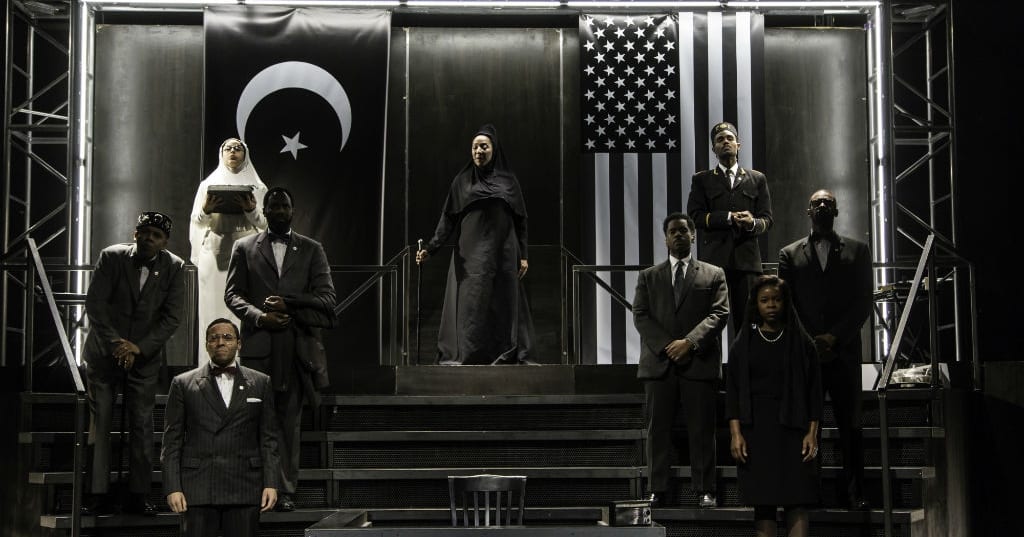A slickly-dressed, silver-tongued man is talking a mile a minute, and his words are so harmonious that, if you knew nothing about Malcolm X’s life and assassination, you would buy into every word he said. The man is Louis X (J.D. Mollison), also known as Louis Farrakhan – Malcolm X’s assistant minister. And, allegedly, his killer.
So says Betty Shabazz (Roslyn Ruff), the austere woman dressed in widow’s clothes but speaking with the combined authority of a powerful lawyer and an all-knowing mother. Betty and Louis are facing off in court: the fictional trial of Betty Shabazz, Malcolm X’s widow, versus the Nation of Islam – the community which raised Malcolm X to his start as a minister and civil rights influencer, and which, in 1965, reached back out and shot him down again.
This is only the beginning of Marcus Gardley’s X: or, Betty Shabazz v. The Nation. The play draws heavy influence from Shakespeare’s Julius Caesar – and not just because of the obvious correlation between the two slain leaders who stirred up controversy across the board. In the hands of writer Gardley and director Ian Belknap, Malcolm X becomes a modern-day tragic Shakespearean hero, a Black Muslim activist Hamlet: doomed to die from his first tragic misstep in Act One.
X: or, Betty Shabazz v. The Nation is set against a stark backdrop of black and white. A semi-circle of bleachers (a makeshift amphitheater, if you will) serves as the main set. This is where the prosecution and the defense battle it out, all while the judge – a stern woman dressed head to toe in Muslim robes, with only her face and hands showing – watches on, occasionally banging a staff on the ground to restore order. Hanging on the wall are a black-and-white American flag and a black-and-white Islamic flag. And that’s to say nothing of the venue itself. The production is hosted by St. Clements, a beautiful old Episcopal church with stone walls and sweeping ceilings. The space was partially converted into an Off-Broadway theater in the 1960s, and the awe-inspiring setting perfectly complements the reverential, sometimes even spiritual tone of the show.
Two fantastic characters – Louis X and Betty Shabazz (portrayed by two fantastic actors) – come together, years after the assassination of Malcolm X in front of a judge and a jury. Betty, spitting with vitriol and yet still laying out her case with the clearest of heads, maintains that Louis and the Nation shot her husband. But Louis, building a case on a string of reasonable doubts glossed over by his panache, points instead to the FBI. Besides, he claims: the Nation built Malcolm X. He was their property, and he can be built again. And so he summons Malcolm (Jimonn Cole) back to life. And we – the jury, of course – relive the end of Malcolm X’s life, ad told by both sides of the story.
There aren’t enough words to properly convey the magnitude of this show. The acting, the directing, and the writing each on their own are worthy of a five-star review. Part noir-murder-mystery, part courtroom drama, part Shakespearean tragedy, mixed with the haunting cries of a sort-of Greek chorus, X: or, Betty Shabazz v. The Nation is a masterful tribute to and reincarnation of the legacy of Malcolm X. There’s nothing left to say except to go see it before it closes.

